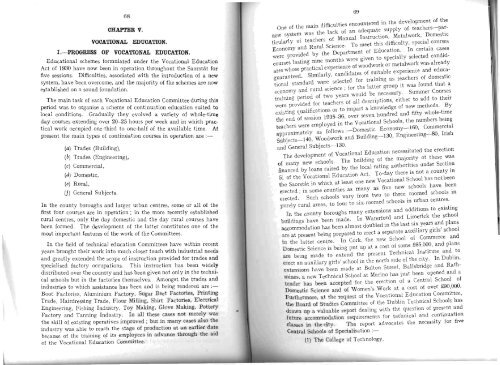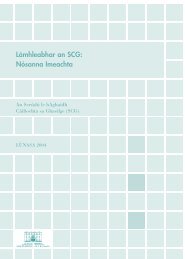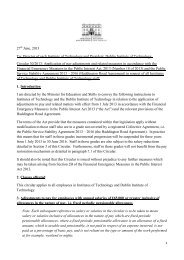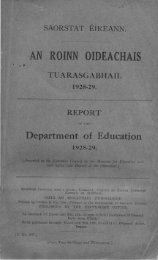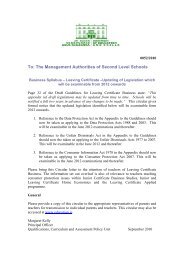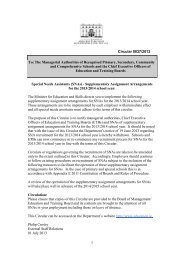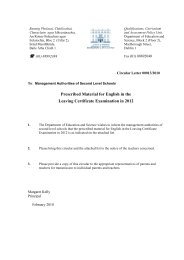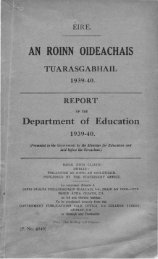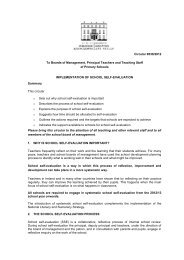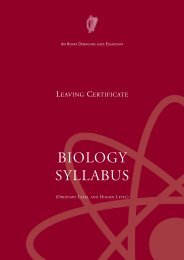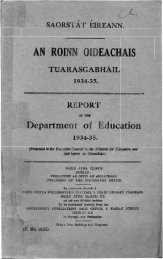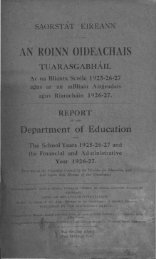66for the previous year was 34. There were seven recognised teacherswho came within the authorised quotas in their respective schools butwere not paid Incremental Salary, three <strong>of</strong> these having had no previousapproved teaching service to place them on the scale <strong>of</strong> payments<strong>and</strong> four others having failed to submit claims.The number <strong>of</strong> schools in which the number <strong>of</strong> eligible teachersemployed was less than the quota <strong>of</strong> teachers entitled to receiveIncremental Salary was 221, <strong>and</strong> the number <strong>of</strong> schools in which the'number <strong>of</strong> recognised teachers exceeded the authorised quota was 38.The corresponding figures for the previous school year were 213 <strong>and</strong> 29'respectively.There was a decrease in the number <strong>of</strong> teachers admitted to the'Register <strong>of</strong> Secondary Teachers in <strong>1935</strong>-36, as compared with thenumber admitted in the school year 1934-35-the total admissions.being 136 (<strong>of</strong> whom 92 teachers were definitively registered), as comparedwith 167 in the previous year (<strong>of</strong> whom 99 were definitivelyregistered) .V.SECONDARY TEACHERS' SUPERANNUATION SCHEME.Of the total <strong>of</strong> 1,393 recognised teachers serving in SecondarySchools in the school year <strong>1935</strong>-36, 427 were members <strong>of</strong> the SuperannuationScheme, <strong>and</strong> <strong>of</strong> these 375, or 87.8 per cent. <strong>of</strong> the total werelay teachers. Applications for admission to the scheme were acceptedfrom seventeen teachers during that year. The total number <strong>of</strong>persons to whom pensions have been awarded from the inception <strong>of</strong>the scheme to the 31st July, <strong>1936</strong>, is 90.Of the total <strong>of</strong> 51 Preparatory College teachers serving during theschool year <strong>1935</strong>-36, 33 (25 lay teachers <strong>and</strong> 8 religious) were members.<strong>of</strong> the Superannuation Scheme. Applications for admission to thescheme were accepted from four lay teachers during the School Year;two lay teachers ceased to be members <strong>of</strong> the scheme on resignation;VI.SCHOLARSHIPS.The various schemes referred to in previous <strong>Report</strong>s for providing~cholarships continue to operate. Statistics regarding Scholarshipsm Secondary <strong>and</strong> Vocational Schools <strong>and</strong> University Scholarshipsawarded by County <strong>and</strong> Borough Councils will be found at Section IX<strong>of</strong> Chapter I, <strong>and</strong> in the Appendices to this report. Particulars as toscho~arships awarded by the State on the results <strong>of</strong> the Intermediate.Certificate Examination <strong>of</strong> <strong>1936</strong> are also set out in the Appendices.6717 Scholarships were awarded in <strong>1936</strong> under the <strong>Department</strong>'sScheme <strong>of</strong> scholarships to Secondary Schools for students from theFior-Ghaedhealtacht; 5 <strong>of</strong> these scholarships were obtained by boys<strong>and</strong> 12 by girls; 84 scholarships in all are being held in the schoolyear <strong>1936</strong>-37 under this scheme <strong>of</strong> which 67 are held by girls <strong>and</strong> 17by boys. The holders are distributed over 16 schools in Classes A <strong>and</strong>B<strong>and</strong> 5 Preparatory Colleges.During the school year <strong>1935</strong>-36 the total number <strong>of</strong> scholarshipsin operation in Secondary <strong>and</strong> Vocational Schools under awards madeby the <strong>Department</strong> <strong>and</strong> by County <strong>and</strong> Borough Councils were as•follows :-(a) The number <strong>of</strong> Scholarships in Secondary <strong>and</strong>Vocational Schools awarded by County orBorough Councils(i) Secondary Schools(ii) Training Colleges or Vocational Schools(b) Scholarships awarded by the <strong>Department</strong> onthe results <strong>of</strong> the Intermediate CertificateExamination . . . . . . . .(c) Scholarships awarded by the DeIlartmentunder the Scheme for Students from the Fior-Ghaedhealtacht ., .,Total1,098921,190202751,467With regard to (a) <strong>and</strong> (b) it is to. be noted that students may holdscholarships from the <strong>Department</strong> <strong>and</strong> from a County or BoroughCouncil or other public fund or endowment in the same year, but thetotal extent to which a student may benefit from these scholarshipsmust not exceed £50 in any year. The total number <strong>of</strong> students holdingsuch dual scholarships in <strong>1935</strong>-36 was 69.University Scholarships for Fior_GhaedhealtachtStudents.The Minister for <strong>Education</strong> awarded five new University Scholarshipsin <strong>1936</strong> under the Scheme for Students from the Fior-Ghaedhealtacht.There are in all 18 such scholarships nOWbeing held-14 byboys <strong>and</strong> 4 by girls. Five <strong>of</strong> the students are following courses in Arts,six courses in Science, two courses in Arts <strong>and</strong> Commerce, one a coursein Medicine, one course in Medicine <strong>and</strong> Science <strong>and</strong> three postgraduatecourses. All the scholarship holders are in attendance atUniversity College, Galway, except one who, is doing a post-graduatecourse at the 'university<strong>of</strong> Bangor, Wales.
68CHAPTER V.VOCATIONALEDUCATION.I.-PROGRESS OF VOCATIONAL EDUCATION.<strong>Education</strong>al schemes formulated under the Vocational <strong>Education</strong>Act <strong>of</strong> 1930 have now been in operation throughout the Saorstat forfive sessions. Difficulties, associated with the introduction <strong>of</strong> a newsystem, have been overcome, <strong>and</strong> the majority <strong>of</strong> the schemes are nowestablished on a sound foundation.The main task <strong>of</strong> each Vocational <strong>Education</strong> Committee during thisperiod was to organise a scheme <strong>of</strong> continuation education suited tolocal conditions. Gradually they evolved a variety <strong>of</strong> whole-timeday courses extending over 20-25 hours per week <strong>and</strong> in which practicalwork occupied one-third to one-half <strong>of</strong> the available time. Atpresent the main types <strong>of</strong> continuation courses in operation are :-(a) Trades (Building),(b) Trades (Engineering),(c) Commercial,(d) Domestic,(e) Rural,(f) General Subjects.In the county boroughs <strong>and</strong> larger urban centres, some or all <strong>of</strong> thefirst four courses are in operation; in the more recently establishedrural centres, only the day domestic <strong>and</strong> the day rural courses havebeen formed. The development <strong>of</strong> the latter constitutes one <strong>of</strong> themost important features <strong>of</strong> the work <strong>of</strong> the Committees.In the field <strong>of</strong> technical education Committees have within recentyears brought their work into much closer touch with industrial needs<strong>and</strong> greatly extended the scope <strong>of</strong> instruction provided for trades <strong>and</strong>specialised factory occupations. This instruction has been widelydistributed over the country <strong>and</strong> has been given not only in the technicalschools but in the factories themselves. Amongst the trades <strong>and</strong>industries to which assistance has been <strong>and</strong> is being rendered are ;-Boot Factories, Aluminium Factory, Sugar Beet Factories, PrintingTrade, Hairdressing Trade, Flour Milling, Shirt Factories, ElectricalEngineering, Fishing Industry, Toy Making, Glove Making, PotteryFactory <strong>and</strong> Tanning Industry. In all these cases not merely wasthe skill <strong>of</strong> existing operatives improved; but in many cases also theindustry was able to reach the stage <strong>of</strong> production at an earlier datebecause <strong>of</strong> the training 0'£ its employees in advance through the aid<strong>of</strong> the Vocational <strong>Education</strong> Committee.•69One <strong>of</strong> the main difficulties encountered in the development <strong>of</strong> thenew system was the lack <strong>of</strong> an adequate supply <strong>of</strong> teachers-particularly<strong>of</strong> teachers <strong>of</strong> Manual Instruction, Metalwork, DomesticEconomy <strong>and</strong> Rural Science. To meet this difficulty, special courseswere provided by the <strong>Department</strong> <strong>of</strong> <strong>Education</strong>. In certain casescourses lasting nine months Were given to specially selected c<strong>and</strong>idateswhose practical experience <strong>of</strong> woodwork or metalw.ork was alreadyguaranteed. Similarly, c<strong>and</strong>idates <strong>of</strong> suitable experience <strong>and</strong> educationalst<strong>and</strong>ard were selected for training as teachers <strong>of</strong> domesticeconomy <strong>and</strong> rural science; for the latter group it was found that atraining period <strong>of</strong> two years would be necessary. Summer Courseswere provided for teachers <strong>of</strong> all descriptions, either to add to theirexisting qualifications or to impart a knowledge <strong>of</strong> new methods. Bythe end <strong>of</strong> session <strong>1935</strong>-36, over seven hundred <strong>and</strong> fifty whole-timeteachers were employed in the Vocational Schools, the numbers beingapproximately as follows :_Domestic Economy-lOO, CommercialSubjects- 140, Woodwork <strong>and</strong> Building-130, Engineering-SO, Irish<strong>and</strong> General Subjects-130.The development <strong>of</strong> Vocational <strong>Education</strong> necessitated the erection<strong>of</strong> many new schools. The building <strong>of</strong> the majority <strong>of</strong> these wasfinanced by loans raised by the local rating authorities under Section51 <strong>of</strong> the Vocational <strong>Education</strong> Act. To-day there is not a county inthe Saorstat in which at least one new Vocational School has not beenerected; in some counties as many as five new schools have beenerected. Such schools vary from two to three roomed schools inpurely rural areas, to four to six-roomed schools in urban centres.In the county boroughs many extensions <strong>and</strong> additions to existingbuildings have been made. In Waterford <strong>and</strong> Limerick the schoolaccommodation has been almost doubled in the last six years <strong>and</strong> plansare at present being prepared to erect a separate auxiliary girls' schoolin the latter centre. In Cork, the new School <strong>of</strong> Commerce <strong>and</strong>Domestic Science is being put up at a cost <strong>of</strong> some £65,000, <strong>and</strong> plansare being made to extend the present Technical Institute <strong>and</strong> toerect an auxiliary girls' school in the north side <strong>of</strong> the city. In Dublin,extensions have been made at Bolton Street, Ballsbridge <strong>and</strong> Rathmines,a new Technical School at Marino has just been opened <strong>and</strong> atender has been accepted for the erection <strong>of</strong> a Central School <strong>of</strong>Domestic Science <strong>and</strong> <strong>of</strong> Women's Work at a cost <strong>of</strong> over £90,000.Furthermore, at the request <strong>of</strong> the Vocational <strong>Education</strong> Committee,the Board <strong>of</strong> Studies Committee <strong>of</strong> the Dublin Technical Schools hasdrawn up a valuable report dealing with the question <strong>of</strong> present <strong>and</strong>future accommodation requirements for technical <strong>and</strong> continuationclas ses III . th e Cl 't y. The report advocates the necessity for fiveCentral Schools <strong>of</strong> Specialisation ;-(1) The College <strong>of</strong> Technology,
- Page 2 and 3: ,SAORSTAT EIREANN.AN ROINN OIDEACHA
- Page 4 and 5: CHAP.PREFACECONTENTSPART I.-REPORTP
- Page 6 and 7: PARTI-R'EPORTPREFACEThe Statistics
- Page 8 and 9: "'4eleven of the Counties or County
- Page 10 and 11: , 'LAN 256 CHILDREN IN 6 ROOl1S •
- Page 12 and 13: 6.Van Servicesunder specialVan Serv
- Page 14 and 15: 10(c) Open Competition Candidates 2
- Page 16 and 17: 14IS(b) AppOintment of Pupil Teache
- Page 18 and 19: 18expectation that by then the teac
- Page 22 and 23: 26At::.dteAStA Am",C 'Oo'n ce",tRu
- Page 24 and 25: 3130successful in obtaining scholar
- Page 26 and 27: 34Dublin, Galway, Kerry, Limerick,
- Page 28 and 29: PrincipalDefectsNose and Throat ..E
- Page 30 and 31: 42County Louth. During the year 193
- Page 32 and 33: 46The number and percentage of prin
- Page 34 and 35: 50The School Meals (Gaeltacht) Act,
- Page 36 and 37: 54quantity is available, otherwise
- Page 38 and 39: 58in schoolwork. In the case of the
- Page 40 and 41: 62m.CURRICULUM AND EXAMINATIONS.In
- Page 44 and 45: 70(2) The High School of Commerce,(
- Page 46 and 47: 74schools where rural science teach
- Page 48 and 49: 78Flour Milling.-Classes in Cereal
- Page 50 and 51: 82and staples. Through the co-opera
- Page 52 and 53: 86An important development in conne
- Page 54 and 55: 90staff, an effort was made to cate
- Page 56 and 57: 94the latter group, the examination
- Page 58 and 59: 98It is a pleasing feature that as
- Page 60 and 61: 102erection of a school at Ballinge
- Page 62 and 63: 106Metalwork and Motor Car Engineer
- Page 64 and 65: 110The ten Scholarship-holders bega
- Page 66 and 67: 114In one particular case, the exca
- Page 68 and 69: 118painstaking work is done in conn
- Page 70 and 71: 122The Furniture Collections were s
- Page 72 and 73: 126 127Mr. T. Gaisford St. Lawrence
- Page 74 and 75: 130REFORMATORYSCHOOLS.Literary Inst
- Page 76 and 77: Endowments Directly Administered by
- Page 78 and 79: APPENDIX I.SAORSTAT EIREANN GENERAL
- Page 80 and 81: 142 143(3) Schools with an average
- Page 82 and 83: 14619. The following table shows fo
- Page 84 and 85: 15022 (a). RETURNshowing, for the Y
- Page 86 and 87: Statement showing Number of Pupils
- Page 88 and 89: l'l"ca't:Q)o.s.0.~~.:::...,;:l.0~.;
- Page 90 and 91: l62163INDUSTRIALSCHOOL CHILDREN ATT
- Page 92 and 93:
165UNIVERSITY GRADUATES ..38. The n
- Page 94 and 95:
170171o-l..:•• o1-""o00'00..•
- Page 96 and 97:
IIiJjol"2.~~;;:;0iJjiJj~ ~~~,..,,..
- Page 98 and 99:
178Vr.-TABLE showing the Areas in w
- Page 100 and 101:
ui~•....•o~!--l>. >,~ ~ ~ >-li:
- Page 102 and 103:
187186XV.-UNlVERSITY SCHOLARSmpS AW
- Page 104 and 105:
190XVIIJ.-TABLE SHOWING THE NUMBERS
- Page 106 and 107:
194XVII I.-TABLE SHOWING THE NUMBER
- Page 108 and 109:
198XVII I.-TABLE SHOWING THE NUMBER
- Page 110 and 111:
202XVIII.-TABLE SHOWING THE NUMBERS
- Page 112 and 113:
205CLASSES UNDER VOCA nON AL ED UCA
- Page 114 and 115:
207No. 1 (b)CLASSES UNDER VOCATIONA
- Page 116 and 117:
-----r-TOTALSCOMBINED TOTALS210 RET
- Page 118 and 119:
214RETURN No. 1 (d).TABLE showing a
- Page 120 and 121:
Showing for the SessionRETURN NO. 2
- Page 122 and 123:
22222~'0 .::cdVI .,~cdG'" §VI'0 o2
- Page 124 and 125:
226227Name-ofCentre"GroupXame of Ce
- Page 126 and 127:
RETURN No. G.-LISTOF CANDIDATES TO
- Page 128 and 129:
234APPENDIXVII.REFORMATORY AND INDU
- Page 130 and 131:
238Table K.-Number and Causes of De
- Page 132 and 133:
242(3) EARLY CHRISTIAN, PRE-NORMAN.
- Page 134 and 135:
246 247I.-Collection of Art Metalwo
- Page 136 and 137:
250Book, palm leaves in wooden hold
- Page 138 and 139:
254Pamphlet, " No Conscription," ad
- Page 140 and 141:
l'arous Acquisitions.258Remains of
- Page 142 and 143:
262GIBBON DE BURGO (Augustinus) : D
- Page 144 and 145:
266___ The picture of Dorian Gray.
- Page 146:
27011-loCfA1U se Le Lucc 1'0,ns,ste
- Page 149 and 150:
-o.g.•o.gg/"-iz-/"'g/z-/z-/z-/z1)


